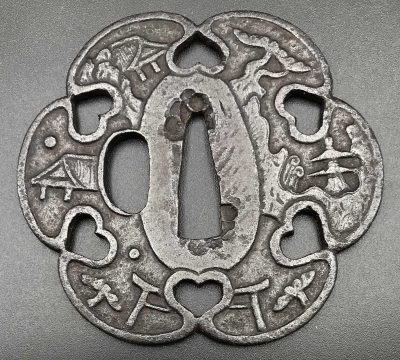
Varshavsky Collection: TSU-0345.2018
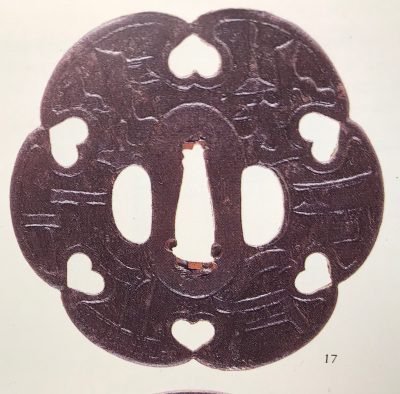
Compton Collection, part II, pp. 14-15, №17: Kamakura-bori tsuba, ca. 1450.
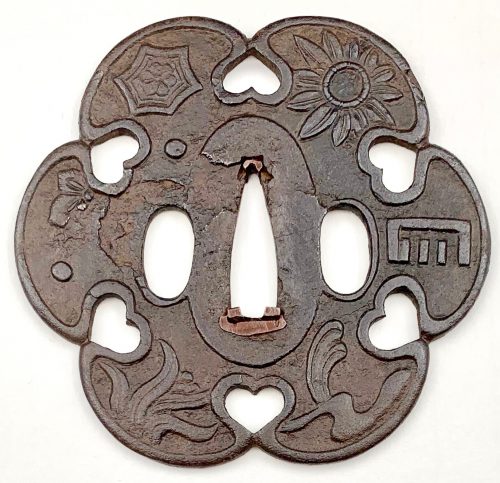

Varshavsky Collection: TSU-0345.2018

Compton Collection, part II, pp. 14-15, №17: Kamakura-bori tsuba, ca. 1450.
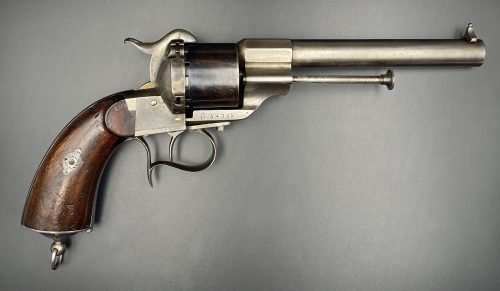
Six shot 11-millimetre Lefaucheux Brevete M-1854 single-action pin-fire revolver, serial #34755. French large calibre revolver features octagon to round barrel, non-fluted cylinder, walnut grips with the heavy pommel.
Manufactured in Paris.
Dimensions: L: 29.5 cm; H: 15.5 cm; Barrel: 16 cm.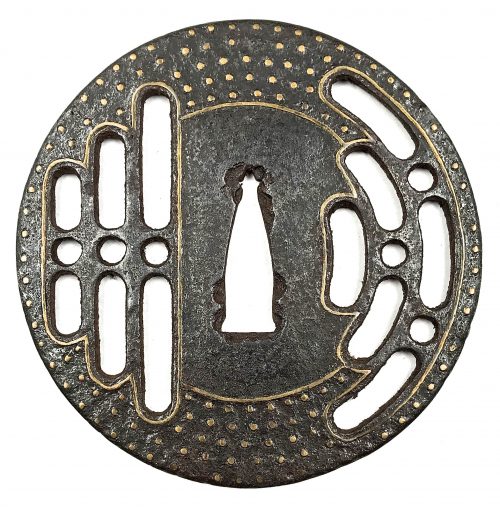
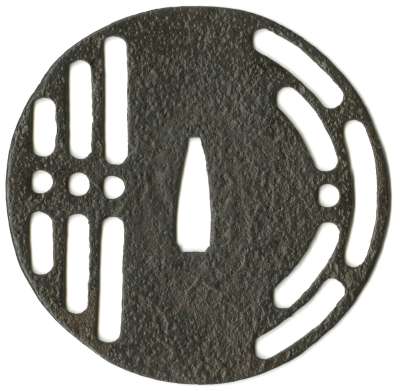
TSU-0353: Tōshō tsuba, Muromachi period.

A kamakura-bori tsuba. Momoyama period. Freeman & Sharpe Memorial Collections.
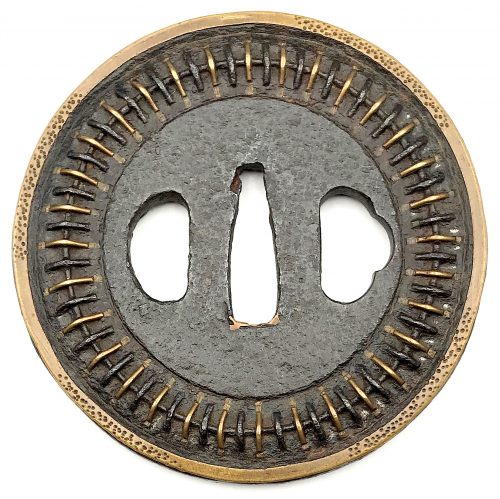
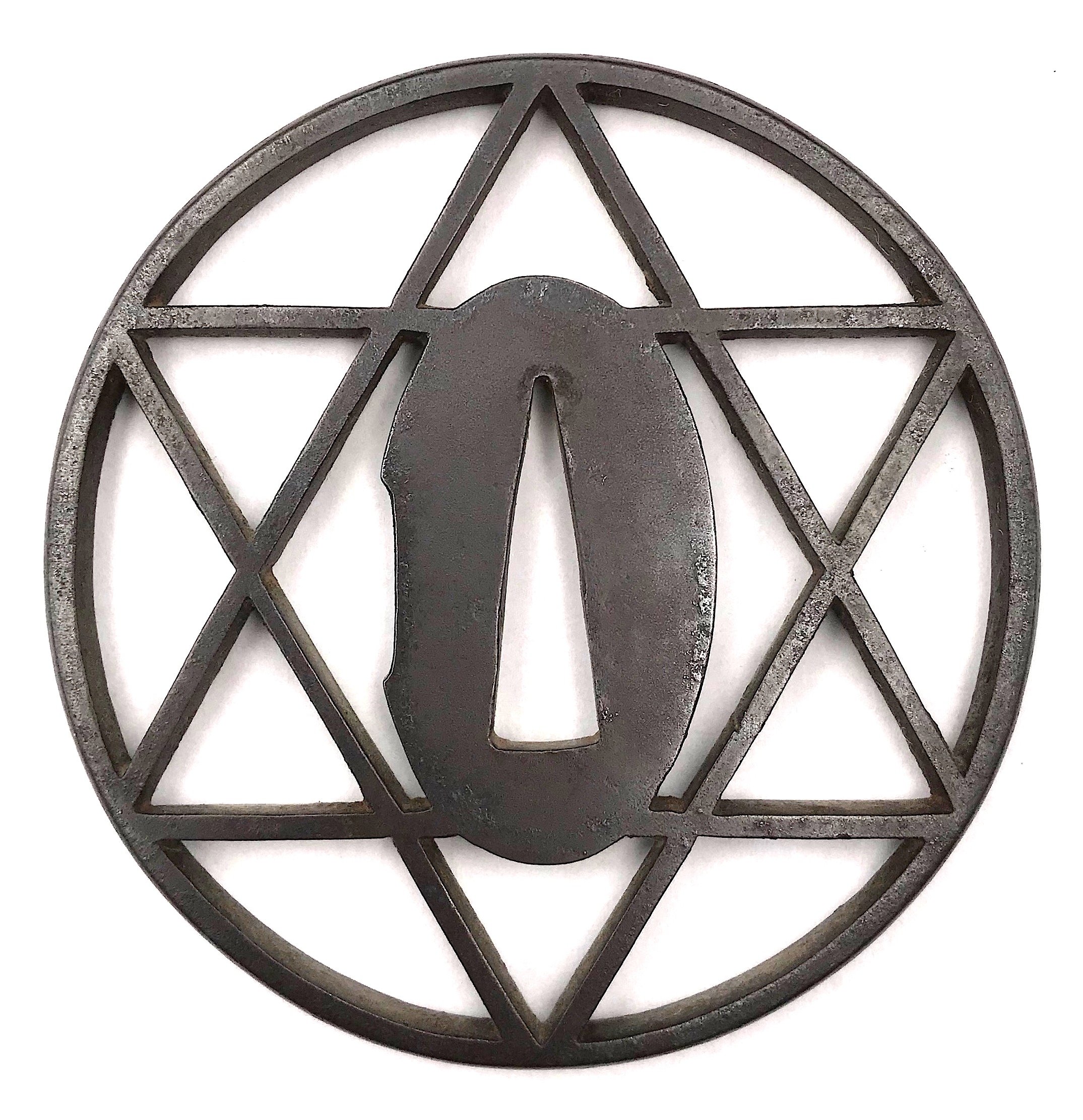
Size: 71.4 x 70.2 x 5.2 mm.
An association with the Star of David is doubtful if not impossible.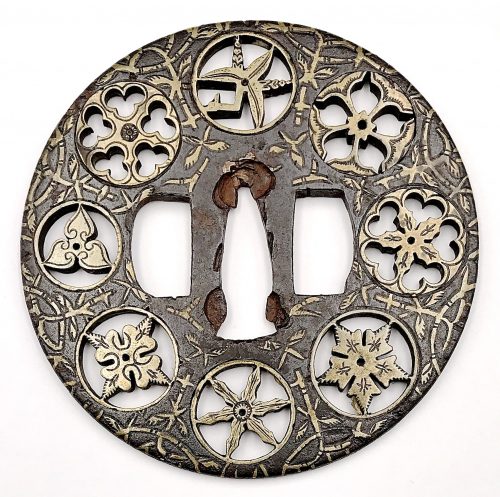
Iron tsuba of round form decorated with eight roundels – circular emblems of flowers and/or family crests (mon) made of cast brass, pierced and chiseled in kebori, and with flat brass inlay (hira-zōgan) of vines or leaves all over the plate. Both hitsu-ana could have been trimmed with brass now lacking. Nakago-ana of triangular form, possibly enlarged, with copper sekigane. All typical emblems with bellflower, two variations on suhama theme, and 3, 4, 5, and 6-poinitng mon variations. A distinctive character of this tsuba is a mon at 12 hours depicting water plantain (omodaka).
“Omodaka was also called shōgunsō (victorious army grass); because of this martial connotation, it was a design favored for the crests of samurai families” [Family crests of Japan, Stone Bridge Press, Berkeley, California]. Yoshirō school (Kaga-Yoshirō). The Momoyama or early Edo period, beginning of 17th century. Size: Height: 81.4 mm; width: 81.2; thickness 3.8 mm at seppa-dai.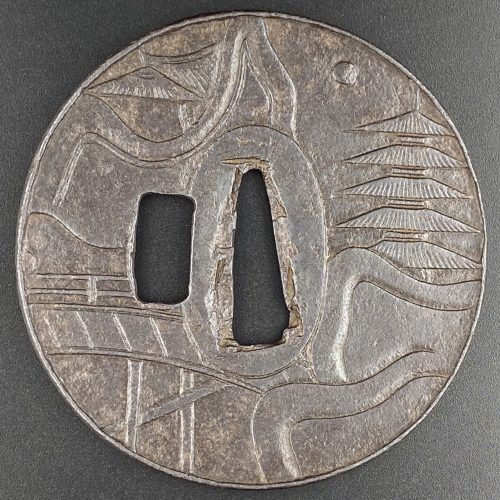
The thin iron plate of round form and black colour carved in sukidashi-bori with the design of rocks, waves, bridge, mountain pavilion and 5-storey pagoda under the moon, on both sides, alluding to Todai-ji temple in Nara. Slightly rounded rectangular hitsu-ana probably pierced later. Very narrow raised rim as usual in katsushi tsuba. In a modern wooden box.
Late Muromachi period, 16th century. Dimensions: 81.1 x 79.5 x 3. mm (seppa-dai), 2.2 mm (base plate), 4.4. (rim).Reference: “Art of the Samurai” on page 232, №140: ”Kamakura tsuba with Sangatsu-do tower and bridge. Muromachi period, 16th century. 83 mm x 80 mm. Unsigned. Tokyo National Museum. The mountain pavilion and bridge carved in sunken relief on the iron tsuba – both part of Tōdai-ji, a temple in Nara – are detailed in fine kebori (line) engraving. As a result of the chiselling used to create the relief, the ground of the piece is relatively thin”. Also page 41 in Tsuba Kanshoki. Kazutaro Torogoye, 1975 [LIB-1480.2018].
This tsuba is very much similar to TSU-0384.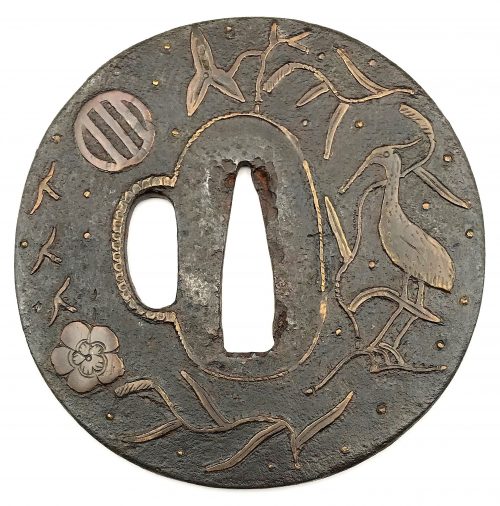
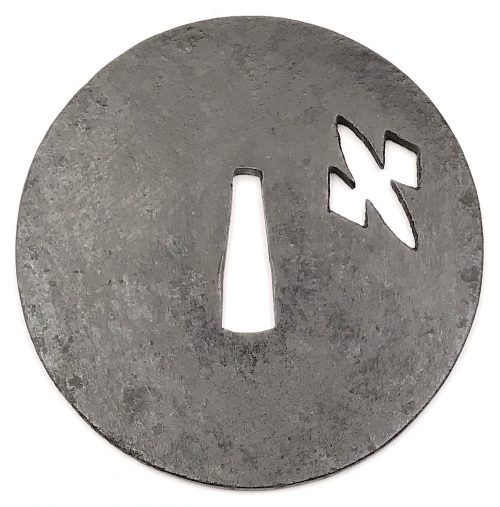
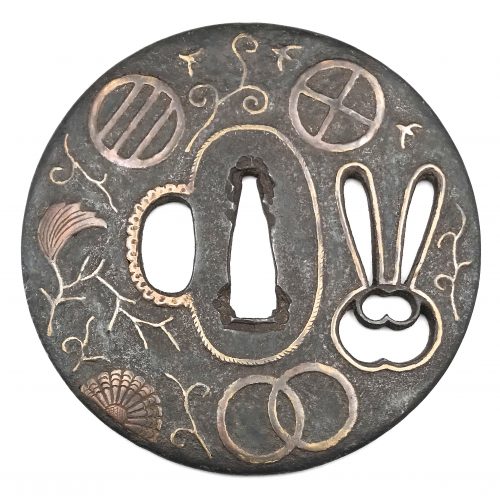
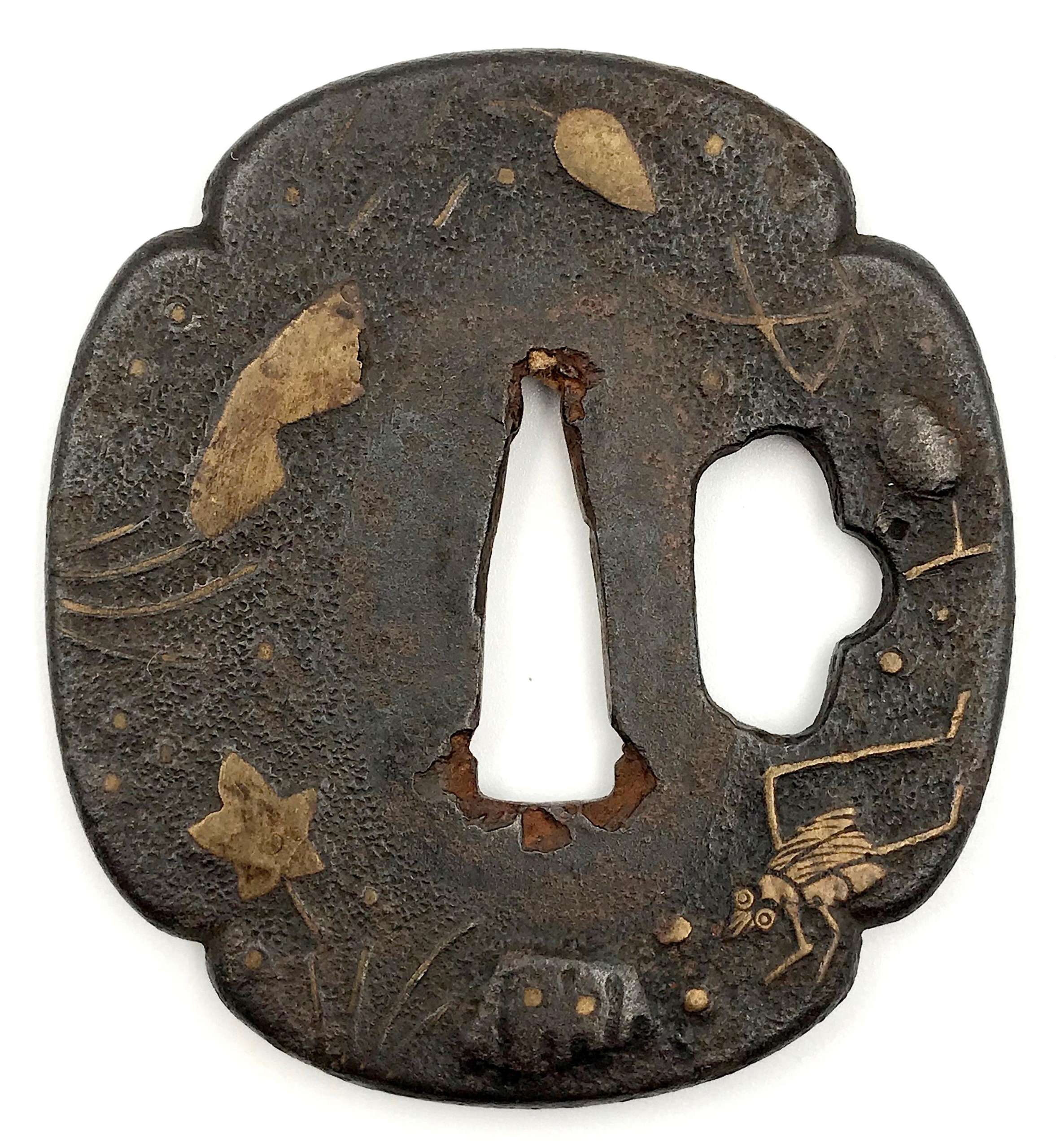
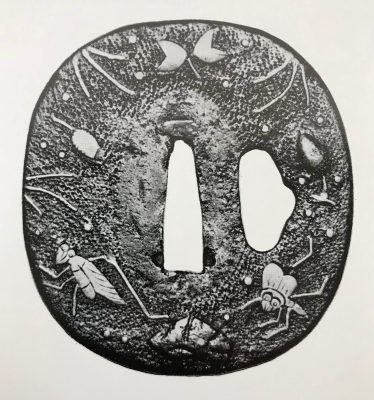
Tsuba Kanshoki, 1975, p. 61: Heianjō tsuba, Momoyama Period.
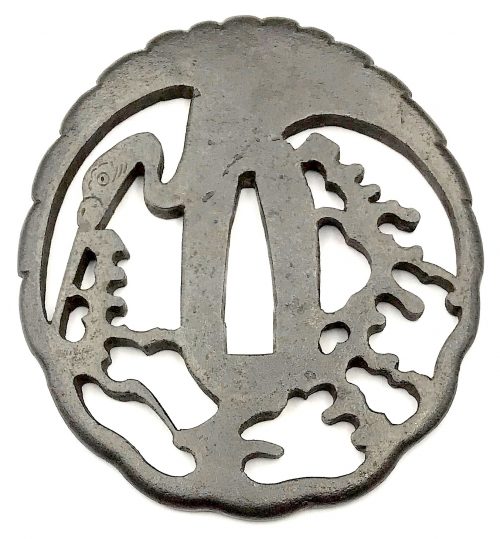
Iron tsuba of round form (tsurumaru) decorated with a design of crane and pines, or "nesting crane (sugomori-tsuru)" in openwork (sukashi). Details carved in kebori. Rounded rim.
Size: 74.7 x 69.8 x 4.8 mm.
Unsigned.
Edo period, ca. 17th century.
NBTHK Certificate № 463485. The certificate says it's a Higo School piece. The design was popular in both Akasaka and Higo schools. The Akasaka example: at Kodogu and tsuba. International collections not published in my books. (Toso Soran). Ph. D. Kazutaro Torigoye, 1978, p. 246: "Late Edo. Jiyūgata. Sined: Akasaka Tadanori saku."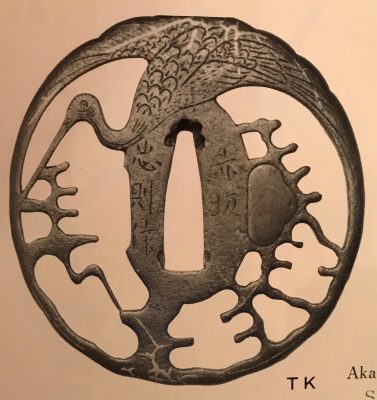
Torigoye, 1978, p. 246. Late Akasaka.
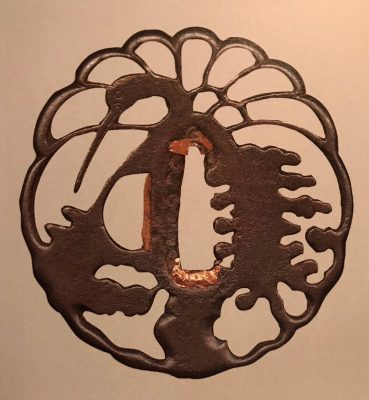
Kurogane no hana, 2014, p. 69, №56. Higo tsuba.
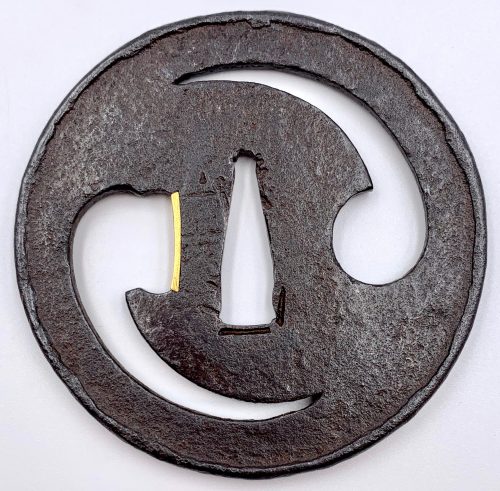
Circular tsuba (marugata ) with design of futatsu-domoe (twofold tomoe) in negative openwork (kage-sukashi), folded-over rim (uchikaeshi-mimi ). The ‘head’ of the left tomoe altered to form an opening for scabbard accessory (kata-hitsu-ana), adorned with gold ategane fitting with file marks (tate-yasurime). The hammer-blow finish of the surface (tsuchime-ji). Signed to the left of nakaga-ana: Yamakichibei (山吉兵). Attributed by Steve Waszak a the Second Generation (Nidai) master.
NBTHK paper [translated by Markus Sesko]:Tomoe-sukashi-tsuba (巴透し鐔).
KANTEI-SHO (鑑定書) - APPRAISAL No 451718
Futatsu-domoe sukashi-tsuba (二巴透鐔) ‒ Tsuba with two tomoe comma openwork design
Signed: Yamakichibei (山吉兵)
Round shape (marugata ), iron, hammerblow finish (tsuchime-ji ), negative openwork design (kage-sukashi ), folded-over rim (uchikaeshi-mimi ), one opening for scabbard accessory
(kata-hitsu-ana) (with gold ategane fitting)
According to the result of the shinsa committee of our society, we judge this work as authentic
and rank it as Hozon Tōsōgu.
February 20, 2007
[Foundation] Nihon Bijutsu Tōken Hozon Kyōkai, NBTHK (日本美術刀劍保存協會)
Diameter: 76 mm, thickness at center 3.9 mm, thickness at rim: 5.1 mm; weight: 102.5 g
Tomoe (Comma): The character 巴 (Chinese pronunciation bā). A pattern resembling the two-comma tomoe (futatsu-domoe) has been found in ancient cultures on all inhabited continents. ...aside from their military function, a ritual or fetish value, perhaps related to their testicular shape. It also has yin-yang connotation. The gold sekigane confirms the high value of the piece to the owner.
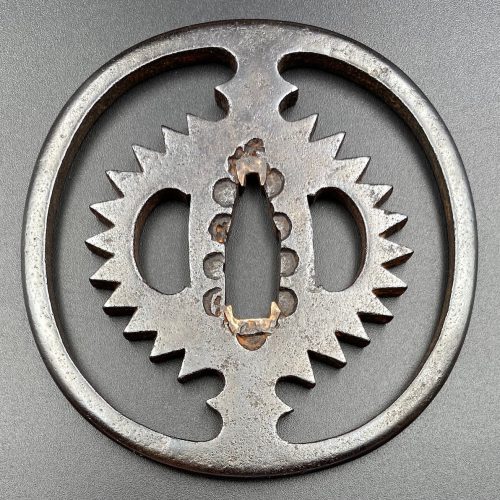
Size: 78.3 x 77.0 x 5.3 mm
For information regarding this type of tsuba see the article 'Kirishitan Ikenie Tsuba by Fred Geyer at Kokusai Tosogu Kai; The 2nd International Convention & Exhibition, October 18-23, 2006, pp. 84-91. School and age attribution thanks to Bruce Kirkpatrick. .
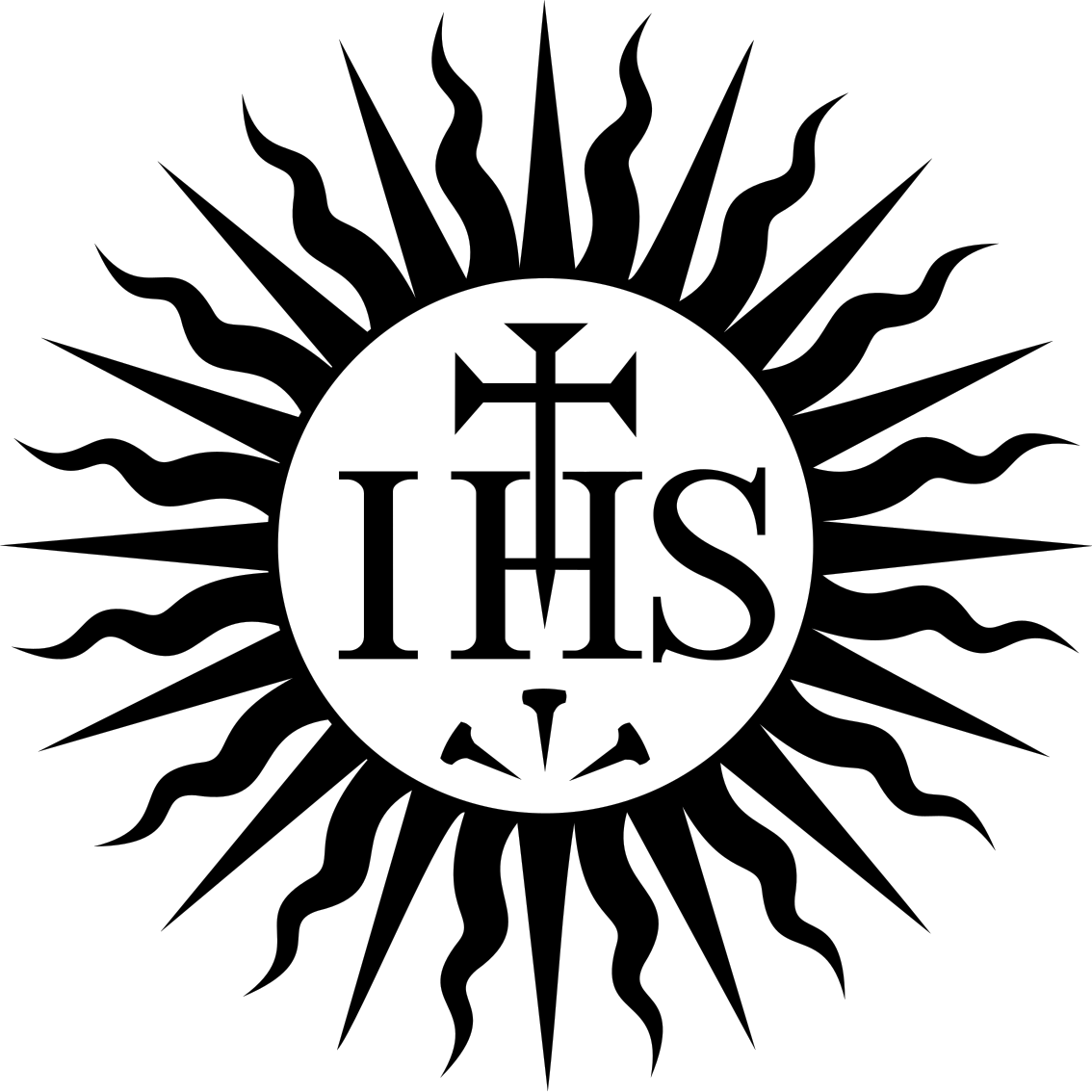 IHS emblem of the Jesuits |
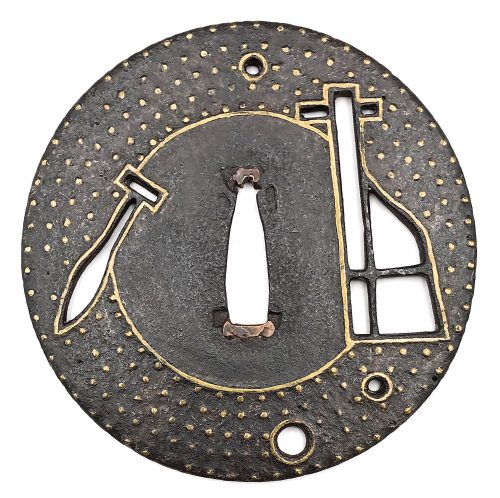
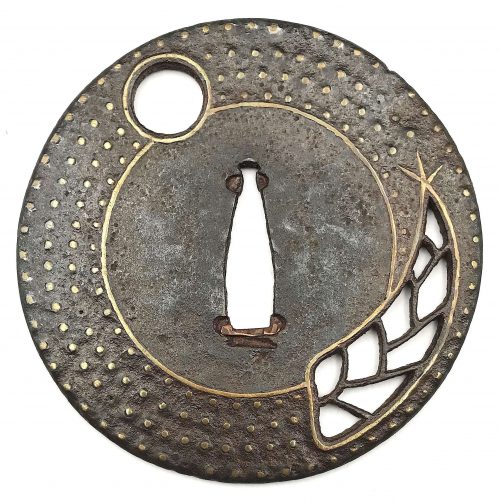
Tears That Brought Bamboo-shoots From the Frozen Earth: Meng Zong Meng Zong lived during the Three Kingdoms Period of China's past. His father died when he was young, and he and his mother struggled to survive. One winter his mother was stricken with a serious illness, and craved some bamboo-shoot broth as medicine. But in the depths of winter, with snow and ice blanketing the ground, where was anyone to find fresh bamboo shoots, shoots that emerge only in the warm months? Nonetheless, Meng Zong, to avoid disappointing his mother, bravely fetched his shovel and went out into the white landscape in search of bamboo shoots. In the thicket he found only frosted leaves and green stalks coated with snowflakes and ice. Look as he might, there were simply no fresh shoots growing in the winter. The thought of his poor mother lying sick on her bed, waiting for bamboo-broth medicine, made his heartache. Uncontrollably, tears began to fall in rivers to the ground beneath the tall, emerald canes. Even now, as his tears flowed down, he kept a light of faith in his heart. If he was truly sincere in his search, perhaps.... Just then Meng Zong nearly tripped and fell over a sharply protruding lump of earth. He quickly knelt down and knocked aside the dirt with his trembling fingers. How uncanny! Underneath his frozen hands he discovered a bed of fresh, tender bamboo shoots! Overjoyed, he gathered up a coatful and carried them back home. The broth that he quickly set stewing in the pot soon cured his mother's illness. The neighbors, hearing the story, exclaimed that it was the strength of his sincere, unselfish, filial resolve that inspired heaven and earth to respond, and to bring up, out of season, the fresh shoots that cured his mother's disease. Before Meng Zong's prayers generated this miracle, it was normally considered impossible for bamboo shoots to grow in the winter. After the nmiracle took place, however, people were able to gather and to eat bamboo shoots all year round. The winter variety that existed hereafter became known as "winter shoots." The villagers were deeply influenced by Meng Zong's courage and devotion. They renamed the spot where the event took place, "Meng Zong's Bamboo Grove". We can now enjoy bamboo sprouts during the winter as well, and as we do so, it is fitting to recollect Meng Zong's outstanding example of filial respect, and reflect on our conduct as sons and daughter of our parents. A verse in his honor says, His teardrops transformed winter at the roots; Up from the ice crept tender bamboo shoots. Instantly, the winter-sprouts matured; Heaven's will: a happy, peaceful world.
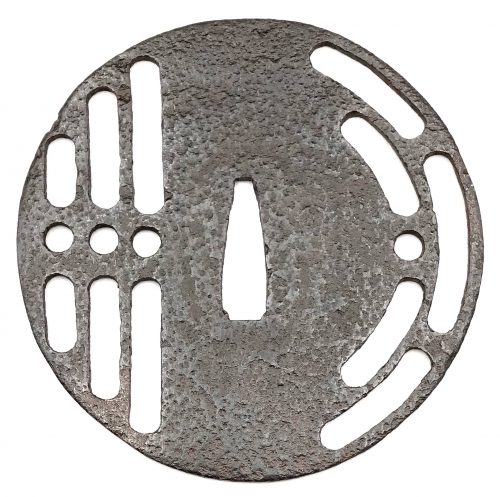
"Traditionally the old iron plate tsuba are classified into Ko Tosho (old sword smith), and Ko Katchushi (old armor maker) styles. It is sometimes difficult to justify attribution of a given tsuba to the Tosho or Katchushi category. Generally guards with raised rims or relatively complex designs tend to be assigned to Katchushi. This is basically a convention we follow out of habit and convenience." [...] "In Token Kai-Shi part six, Articles by Akiyama Kyusaku, Robert Haynes comments: "…from 1300 to 1400 over 150,000 MOUNTED swords were made in Japan for export alone. This means that over four tsuba a day were made for 100 years. This would mean that at least 3000 persons were making nothing but tsuba, let alone all the other fittings needed to complete these swords. With sword smiths, fittings makers and all the other artists need to complete a sword for export, at least 10,000 sword artists were working together, in any one of these hundred years."Reference to design can be found at "Japanese Swords and Tsuba from the Professor A. Z. Freeman and the Phyllis Sharpe Memorial collections" / Sotheby's, London, Thursday 10 April 1997; p. 18-19, lot № 37: "A Kamakura-bori Tsuba, Momoyama Period. ...pierced with two large formalised butterflies..."

A Kamakura-bori tsuba of octagonal form, Momoyama period.
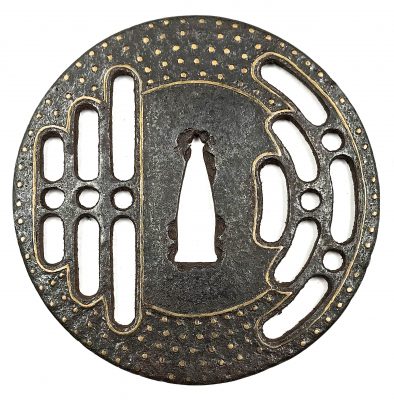
TSU-0319. Ōnin ten-zōgan tsuba, Muromachi period.
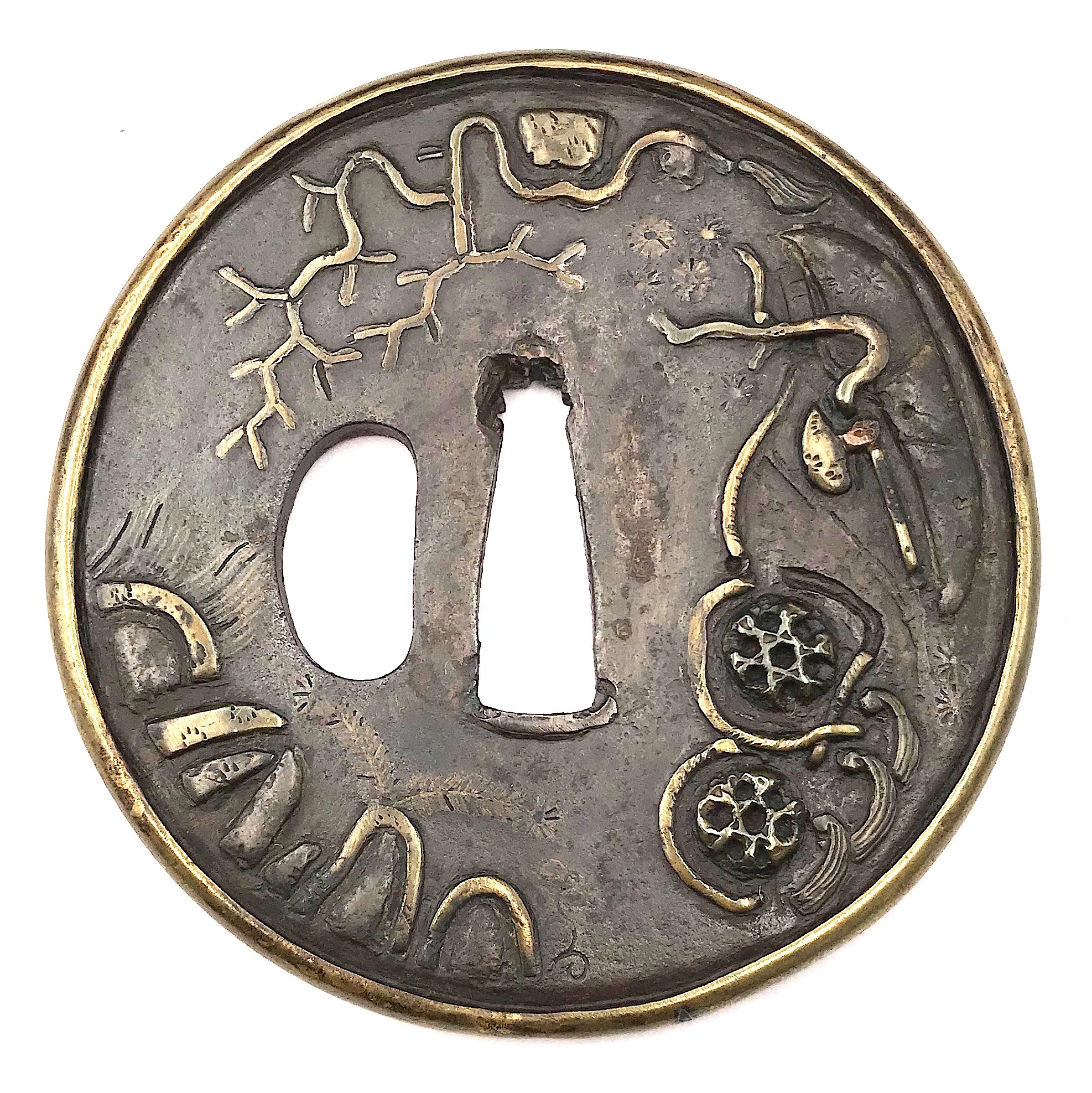
Size: 83.2 x 82.4 x 3.6 mm; 149.2 g
The Carlo Monzino Collection of Japanese sword fittings and swords (Sotheby's, London, 18 June 1996. p. 12-13) №9 provides an illustration of the similar tsuba with the following description: Heianjo tsuba, carved and inlayed with rocks, plants, and waves, also pierced with a jakago [sic] (stone basket).
Gary D. Murtha in his Japanese sword guards Onin - Heianjo - Yoshiro (GDM Publications, 2016) on page 53 shows a look-a-like tsuba (though, with a kogai-hitsu-ana) with the follwoing description: Iron, 77 mm, tsuba with brass tree, snake, jakugo baskets, and curved brass pieces (representing water flowing over rocks). Buddhist halo to reverse. Although showing Onin traits, a Shoami Heiamjo attribution would fit better. Azuchi-Momoyama period.
